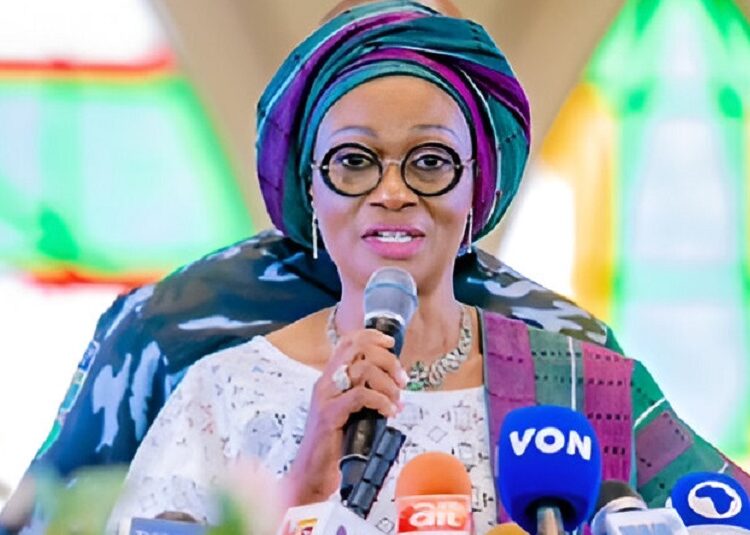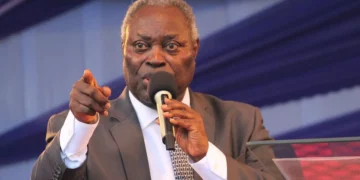On Tuesday, something unusual happened inside the presidential villa. For the first time in memory, a Nigerian First Lady hosted the State House press corps to lunch. No, not a perfunctory “media chat” where handlers hover nervously and aides cut questions short. An actual sit-down meal, where Remi Tinubu witty, often disarming in her candor — spent hours swapping stories with the people whose daily grind is to observe power up close.
For reporters who’ve trailed presidents for decades, this was a first. And that fact alone tells us something. Our First Ladies have always wielded soft power, some more subtly than others, but rarely have they invited the presidential press corps into their personal orbit. The Villa is a fortress, built on ceremony and distance. To open its doors, even for lunch, carries more weight than the menu.
I’ve covered two presidents myself and can confirm what others said that afternoon: this had never happened before. In a system where symbolism often matters more than substance, the optics were striking.
Remi Tinubu is not your standard-issue First Lady. She has a Senate record. She has a reputation for bluntness that occasionally unsettles even her husband’s allies. She does not wrap herself in euphemism.
Those who know her from Lagos politics describe someone who will cut you off mid-sentence if she thinks you’re wasting her time. And at 65, she has the kind of confidence that comes with age and a long spell in the trenches.
That personality was on display at lunch. Anecdotes, banter, even mild jabs — all part of the performance. But beneath the convivial atmosphere was a clear message: this First Lady wants to be seen and heard on her own terms, not merely as an appendage of her husband’s presidency. She strengthened the Renewed Hope Agenda, giving a voice to the wives of governors and putting women in public office to better serve the country.
Contrast this with past occupants of the role. Stella Obasanjo wielded influence largely behind closed doors. Turai Yar’Adua built a formidable network but avoided open interaction with the press. Patience Jonathan loved the limelight, but mostly through rallies and flamboyant public appearances, not cozy sessions with Villa reporters. Aisha Buhari, to her credit, often broke ranks to criticize her husband’s government, but she, too, never sought intimacy with the press corps as a collective.
Remi Tinubu’s decision to host them signals something different: a calculated willingness to shape narratives directly, bypassing filters.
Of course, the lunch didn’t happen in a vacuum. It was staged in the afterglow of her 65th birthday, which she had earlier asked Nigerians to mark not with congratulatory adverts but with donations to complete the long-abandoned National Library project. A noble idea, on paper. Who wouldn’t want to see a rotting monument to bureaucratic incompetence finally finished?
Yet the announcement instantly drew suspicion. In a country where every gesture from the Villa is read as political maneuvering, many assumed the fundraiser was a disguised campaign war chest for 2027. Remi Tinubu anticipated that and addressed it head-on, insisting the account was transparent, with the Education Minister and Chief Librarian as signatories. She even reeled off her past philanthropic record — ₦50 million for sickle-cell support at 45, ₦200 million for her New Era Foundation at 50.
Still, optics cut both ways. When she disclosed that donations had already crossed ₦20 billion, including contributions from governors, security chiefs, and business moguls, eyebrows went up. Nigerians have learned the hard way that elite fundraising often doubles as a loyalty test. Will Dangote or Elumelu ever say no to a First Lady’s cause? Exactly.
That is why her lunch with the press mattered beyond the birthday. By breaking bread with reporters, Remi Tinubu was reinforcing the idea that her fundraiser is civic, not political — a national library, not a campaign kitty.
Why does this matter? Because in Nigeria, the relationship between power and the press has always been strained. Reporters covering the Villa are often treated as nuisances — tolerated but not trusted, sometimes rewarded with perks, often starved of real access. Presidents tend to speak through carefully managed statements, while First Ladies hover in a gray zone of influence, seldom directly accountable.
So when the First Lady sits down to lunch with reporters, it signals a loosening of that rigid script. She is saying: I am accessible. I will answer your questions. I will even make jokes at my own expense. Whether this becomes a sustained pattern or remains a one-off gesture is anyone’s guess, but the symbolism is undeniable.
For the press corps itself, it was also a reminder of our role. Access can be flattering; it can also be disarming. When the powerful decide to be charming, reporters must resist being co-opted into cheerleading squads.
There’s another layer. Remi Tinubu’s style reflects something about her husband’s presidency. Bola Tinubu has long operated as a political tactician, building alliances, cutting deals, and rewarding loyalty. He thrives on structure and calculation. Remi, by contrast, operates through symbolic gestures. Together, they present a yin-yang dynamic: one working the machinery of power, the other shaping the moral and cultural atmosphere around it.
In that sense, her decision to host the press may be a preview of how the Tinubu era will play out — a presidency where the First Lady is not ornamental but performative, using her platform to humanise, to provoke, and sometimes to distract. Nigerians should pay attention, because power often leaks through the spaces we least expect.
The National Library project itself deserves a column of its own, but let me say this: it is a perfect metaphor for Nigeria’s dysfunction. Conceived in 1981 under Shehu Shagari. Awarded in 2006 for ₦8.59 billion. By 2023, only 44 percent were completed, with costs ballooning past ₦120 billion. It sits in Abuja’s heart, between mosque and church, a monument to stalled ambition.
That the First Lady has made it her cause is commendable, yes, but also damning. Why should a presidential spouse be leading the charge to complete a national institution? Where is the Ministry of Education? Where is the National Assembly’s oversight? Where is the accountability for billions already wasted?
Remi Tinubu may get the library finished by sheer force of elite fundraising. But if the story ends there, it becomes yet another Nigerian paradox: public infrastructure delivered through private benevolence, not institutional competence. That should worry us more than it pleases us.
So what does all this mean? It means Nigeria’s First Lady is stepping into a role that blends hospitality with political theatre. It means she understands the symbolic power of feeding the press, even as she asks the nation to feed her library project. It means we are likely to see more of her candor in public life, for better or worse.
If the symbolism of this lunch is to mean anything, it should be the start of a new era of openness at the Villa. Regular press briefings, unscripted Q&A sessions, genuine access to decision-makers — these would matter far more than one afternoon of laughter and anecdotes.
Second, the National Library project should not remain a personal crusade. The Ministry of Education must publish a transparent timeline, with costs and contractors named, and monthly progress reports available to the public. If a First Lady can raise ₦20billion in a few months, the Nigerian state can certainly finish an 11-storey building without turning it into a 50-year saga.
For the sake of the crusader, the future of the library project records, and to save newspaper pages from reporting more financial crime investigation stories.Nigerians await the publication of a transparent timeline with costs, contractors’ names, and monthly progress reports from the Ministry of Education.





